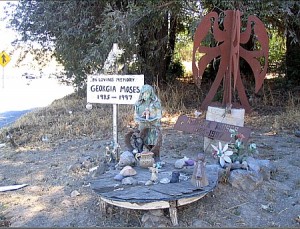
Roadside memorial for Georgia Lee Moses (1985-1997), original location in Petaluma, CA (photo by Richard Beckwith, 2004)
“Georgia Lee” isn’t the song I planned for today. I wanted a break from the heavy stuff. I was working on something lighter, and if it was a real-life story, it was one that occurred well before my lifetime. My writing mind doesn’t always give me the option of going where I plan. “Georgia Lee” preoccupied me.
I blame Pat, at least in part. In his terrific post on “Louis Collins,” he wraps up with a discussion of Josh Ritter’s song “Folk Bloodbath.” I accepted Pat’s invitation to reflect on its final lines:
And I’m looking over rooftops, and I’m hoping that it ain’t true
That the same God looks out for them, looks out for me and you
The angels laid them away…
The “them” in this stanza are the characters killed in the song, an imagined story populated with real life figures from other murder ballads: Stagolee, Louis Collins, Delia, and Billy Lyons. Ritter’s lines struck me as providing an ironically framed and theologically posed raison d’être for murder ballads. How’s that for a grand claim? Surely, the genre is more various and complicated than that, as you and especially my fellow bloggers will be quick to tell me. Ritter, though, puts his lyrical finger on a particular existential insecurity invoked in murder ballads. Singers implicitly invite us to compare our fate to the fortunes of those in these songs. We can’t help but do some level of reconciling of these stories and our own when we listen to them, even if that reconciliation means pushing them away. That we come back such stories suggests that this work is important.
I started listening to Tom Waits’s Mule Variations (1999) while stuck in this frame of mind. After the half-way point of the album, Waits got my attention by asking a question with a theological bent similar to Ritter’s.
Why wasn’t God watching?
Why wasn’t God listening?
Why wasn’t God there for Georgia Lee?
I had to learn more about this song. I knew I wanted to explore it further, but as I dug a little deeper it also seemed way too sad for me to research over the holidays. Indeed, as I was writing this piece, “Georgia Lee” made Peter Foy’s list of “Tom Waits’s Top 5 Saddest Songs.” It involves the real-life murder of a 12 year old girl in 1997; two years younger than Delia Green, and almost a century more recent.
The song wouldn’t turn me loose. Perhaps it was the song itself. Perhaps it was Pat’s post, or Cindy’s before that. Perhaps it involves having adolescent children myself. I even inadvertently picked a novel for vacation that involves themes about adolescents on the margins, children in danger. The song kept coming back to me, asking its questions.
I have a lot of friends who study religion professionally, and a lot of friends who are religious professionals. I sometimes explain this blog to them, somewhat in jest, as a “weekly meditation about stories of someone’s death and what that death means for us.” It winds up sounding pretty familiar to them in that light.
I’m not out to redeem any particular religious claims here, though, just to understand how these songs function artistically. In songs like “Folk Bloodbath” and “Georgia Lee,” for example, I want to understand how religious symbols or questions make the song effective, or don’t. Regardless of what you may or may not believe about God, and regardless of what Waits or Ritter, or the narrators in their songs, may or may not believe, something compelling happens in those lines. I want to go after that.
“I didn’t want to be a part of that.”
Waits wrote “Georgia Lee” with his wife and artistic partner, Kathleen Brennan. Here is how it sounds on Mule Variations.
Mule Variations won Waits the Grammy for Best Contemporary Folk Album of 1999, and is a mix of “old” and “new” Tom Waits; pre- and post-Swordfishtrombones, if you will. On the whole, the album is like a deck of ballads and blues and a deck of “clank and bangers” shuffled together. “Georgia Lee” sits between “Chocolate Jesus” and “Filipino Box Spring Hog,” a song he had reluctantly cut from Bone Machine seven years earlier. The album is a mix of wackiness, hope, mystery, and redemption, which will ultimately be important to keep in mind as we explore today’s song.
To page 2>>>
The post Georgia Lee appeared first on Sing Out!.
